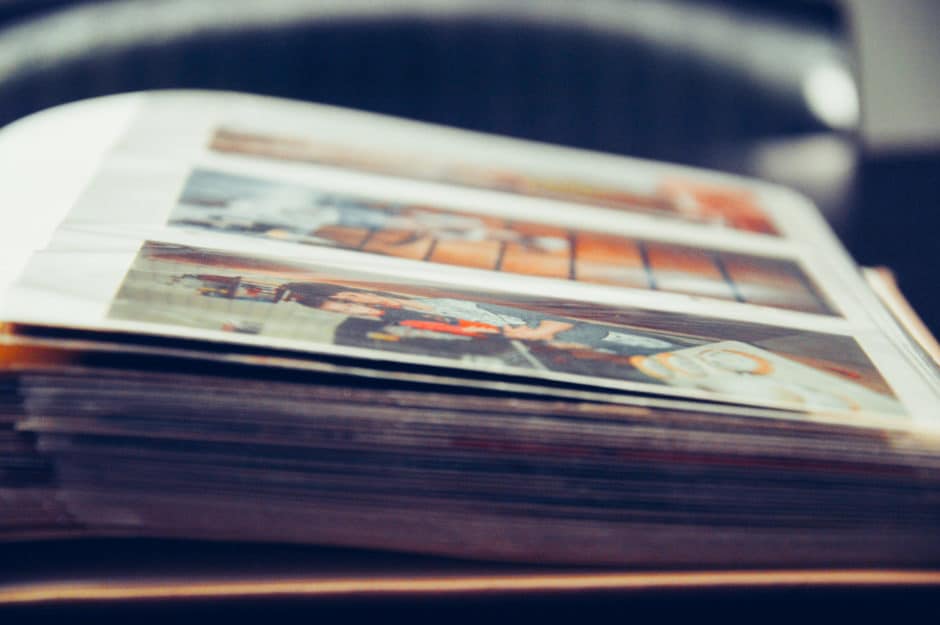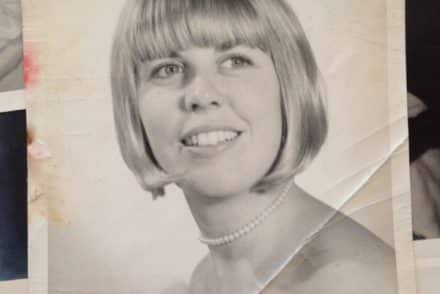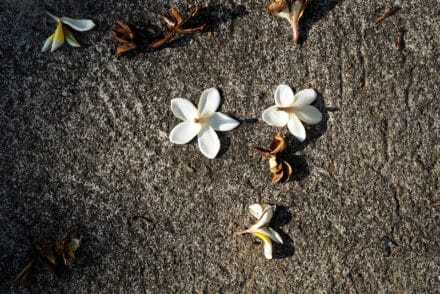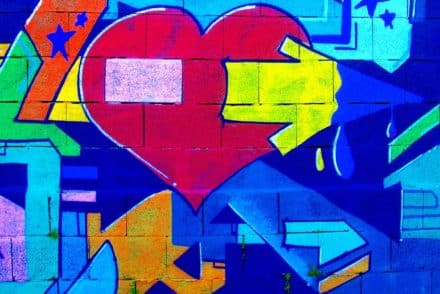By Kelly Garriott Waite
My parents broke the news to my sisters and me one evening after dinner: My mother was having another child. My older sister, understanding our mother to be the Virgin Mary, refused to believe it. But it was true and with four children, we would need more space.
One town north and east, my parents bought forty acres of land we came to call the property. I didn’t consider whose property it had been, nor what memories of the place the previous owners held dear. It was ours now. That was all that mattered.
Weekends, we cleared the woods where our home was to be built, hauling brush and tree limbs to the burn pile, cutting and splitting logs for winter. When we took a break from our work, we wandered, discovering the secrets held by the land. The south field was stubbled with browned corn stalks gripping the soil. In the west field grew, besides corn, a window- and doorless cement building inside of which forgotten coils of thick wire, yellow and red and blue, were hidden by weeds. Where the corn yielded to woods, wild raspberries grew, big as my father’s thumb. A creek trickled through the woods, across which one day we came upon the junk pile, the stuff of life discarded from a long-ago, unknown family who had likely lived on the orchard behind the property. From the junk pile, I found a clear milk bottle from Rand’s Dairy and what my father identified as an ammunition box, from which I tried – and failed – to remove the patina that obscured the copper beneath.
We worked nearly every weekend. We built a barn. We built a house. We built a farm. We learned how to grow our food and preserve the harvest. We cleaned stalls and gathered eggs and nailed up board fencing to wooden posts. On a red wagon whose sides swayed dangerously whenever a tire caught a rut in what used to be the corn field, we learned to bale hay. As we shaped the land to fit our needs, gradually taking it from the property to the farm and, eventually just home, the land shaped us in return; defining our beliefs and becoming the foundation upon which we would build our lives.
As my siblings and I left for college, the barn emptied. My father sold the horses. The butcher loaded the last of the cows and the pigs into his truck. No new chickens appeared to replace those too old to lay eggs. The hayloft would never again house seasonal litters of blind, mewing kittens. My father rented the fields to a local farmer who replanted them in corn. I discarded the ammunition box: Its history held no value for me.
Thirty-seven years have passed since we built that farm. My parents can no longer maintain forty acres. What else to do but sell? They cleaned out the attic and held a garage sale to get rid of the stuff of their lives. My mother began giving away memories.
But that’s impossible. My mother cannot wrap a memory in tissue paper, present it to her children, and have it disappear from her life, something no longer requiring inventorying and packing for relocation. Mementos is the better word.
* * *
On my eldest sister’s fiftieth birthday, my sisters, parents and I gathered in the space that once was a barn, but which, after it was destroyed in a fire, was rebuilt into an office, a workshop and a pottery studio. We persist in calling this structure the barn, even though it has never housed any animals, save a succession of my father’s dogs, each called Bear. Upstairs, in what would have been a loft, were this truly a barn, my mother spread the family photographs on the poker table my father made. My sisters and I were charged with dividing the photographs, with selecting what we wanted and taking them home.
Yet, how to split the past? Who would get my father’s graduation? My mother’s father, whom none of had us met? Who should receive the oldest pictures, those curled-up images with scalloped edges and, hopefully, spidery writing on the back to identify who’d been forgotten? Yes, scanners exist. It is possible to reproduce old photographs. But that consists of laters, and we were dealing in nows. We sifted through the photos carefully, dealt them out, arranged them like so many courteous and reverent and oh-so-cautious hands of poker.
I came home with a pile of photographs feeling unsettled and depressed. Life had called. We had children to meet after school and dinners to prepare. In the end, we divided the pictures haphazardly, each of us taking hundreds and promising to copy the good ones for one another.
Two years on, the photographs I took home sit unexamined and unduplicated in a lidded wicker basket on a shelf in my office.
* * *
On my forty-seventh birthday, my mother handed me a stack of yellowed index cards – my grandmother’s recipes. “I can’t cook these,” she explained. “Dad and I can’t eat this way anymore.” I didn’t want the recipes any more than my mother did. If she wouldn’t make them, neither would I. After a cursory, dismissive, almost haughty glance (Who cooks with lard?), I put the cards in my china cabinet. Occasionally I was reminded of them when I washed my collection of antique tea cups or pulled out a wine glass. I tried to ignore them.
In a thousand years, or in a million, or, God forbid, in a decade (who knows) will any of this matter? When the sun blinks out or California goes dry or the bees have been eradicated, will this stack of recipes, this basket of photographs be relevant? Perhaps all those who pursue looking back as a vocation struggle with the pointlessness of work with a guaranteed expiration date. But that consists of laters, and I’m dealing in nows. It’s useless to work against such vague deadlines.
* * *
It turns out that my parents are not moving, at least not yet. They sold the majority of the farm to the township, which will use it for government buildings, ball fields and a nature preserve. Bulldozers sit in the front pasture. Workers move rocks and fell pine trees planted by my mother four decades ago. Contractors have put in a gravel driveway along the eastern part of the pasture, the wooded side where the cows used to lie beneath trees on hot days. When I was no more than twelve, my sisters and I unrolled steel fencing through those woods before testing our wits against the pulsing electric wire that kept the animals in, one sister dangling a length of grass onto the shiny metal, each of us handing the current, one to the other through hands tightly clasped until someone fell and broke the chain.
The township has redefined the woods and the shape and the character of my home. The place of creeks and woods, of wild berries and corn fields and mysterious buildings is gone. Future generations of children will hit their first home runs onto the field where I once baled hay, their proud parents snapping pictures while distracted mothers in folding chairs search Pinterest for quick and easy dinner recipes.
Today, as my sister pulls in the driveway of my parents’ home, on the occasion of my mother’s seventy-fourth birthday, I notice that the township property has been given its own address. And I suddenly understand the meaning behind my mother’s handing over the recipes, the distribution of the photographs: She doesn’t want her history to be lost.
* * *
Back at home, I pull out my grandmother’s recipes, noting for the first time the occasional name in the upper right hand corners of the index cards. Helen…Anna…Ellen. I write to my mother and ask her to identify the women. Anna was my grandmother’s half-sister who immigrated with her parents to the United States from Russia. Another Anna, a lifelong friend, used to position herself across from restaurant mirrors so that she could admire herself over dinner. Ellen befriended my grandmother after she moved from Chicago to Escondido. Hearing these stories created a hunger in me to know more about my mother’s history: Why did the family move from Johnstown to Chicago? How did my grandmother’s mother survive marrying at seventeen and immediately becoming a stepmother to four children?
Mementoes split from their memories have no meaning. In order for these recipes and these photographs to have value, I must understand their past. I grab a stack of pictures from the wicker basket and promise myself to take them to the farm the next time I head home. It is time to gather great armloads of my parents’ stories, to grasp them tightly, and, in time, pass them to my children together with pictures and recipes and a Rand’s Dairy bottle, for me a memento of the land I will forever hold in my heart.
Kelly Garriott Waite’s work has appeared in the Christian Science Monitor, the Globe and Mail, the Philadelphia Inquirer, and elsewhere. She is currently writing about her search for the stories of both her great-grandfather, who immigrated from Russian-owned Poland, as well as the forgotten owner of her historical Ohio home, an English immigrant who married into a Native American family.

Join Jen for a weekend retreat at Kripalu Center in Western Massachusetts Feb 19-21, 2016.
Get ready to connect to your joy, manifest the life of your dreams, and tell the truth about who you are. This program is an excavation of the self, a deep and fun journey into questions such as: If I wasn’t afraid, what would I do? Who would I be if no one told me who I was?
Jennifer Pastiloff, creator of Manifestation Yoga and author of the forthcoming Girl Power: You Are Enough, invites you beyond your comfort zone to explore what it means to be creative, human, and free—through writing, asana, and maybe a dance party or two! Jennifer’s focus is less on yoga postures and more on diving into life in all its unpredictable, messy beauty.
Note Bring a journal, an open heart, and a sense of humor. Click the photo to sign up.





2 Comments
Beautiful.
Beautiful.